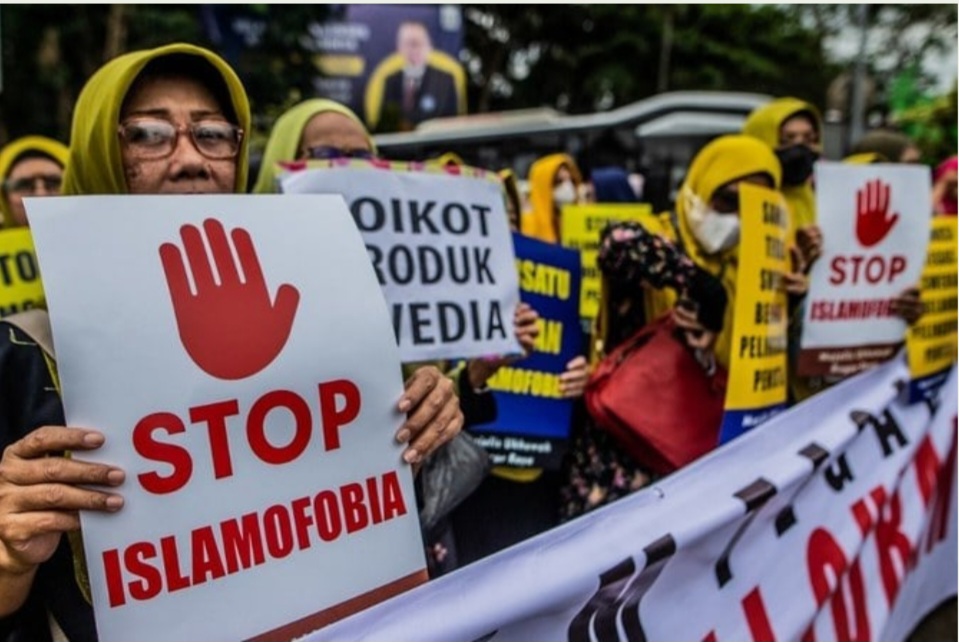
It is not just Muslims who should be offended. Everyone with an interest in dialogue and coexistence should join in the condemnation of the recent burning of a Qur’an by right-wing activists in Sweden.
In itself, what happened was a terrible and provocative act, designed only to inflict pain on observant Muslims. Arguing that it is a form of worthy “free speech” is a cop-out that compounds the insult.
Such affronts to human dignity can have consequences. There is no justification for violence in response, but it is hardly a surprise that extremists anywhere might try to use this event to further their aims. The US State Department’s warning this week of the potential for a terrorist attack on synagogues, churches and diplomatic missions in Istanbul serves as such a reminder.
Tensions remain high since last month’s desecration of Islam’s holiest book at a political demonstration in front of the Turkish Embassy in Stockholm, which occurred amid ongoing deliberations between the two countries related to Sweden’s NATO accession bid. The debate is not religious in nature and making it about religion reveals everything about the intentions of the provocateurs here.
Rasmus Paludan, who burned the Qur’an, is the leader of the Danish far-right political party Hard Line. He has engaged in similar acts before, designed primarily to spark outrage and garner attention. Muslim groups, as well as Christian, Jewish and other organizations in the West, have all unambiguously decried his behavior. Among Jewish communities, those in Sweden and Denmark condemned Paludan, as well as several US-based organizations such as the Anti-Defamation League and B’nai B’rith International.
But others have been more conspicuous in their criticism.
The debate is not religious in nature and making it about religion reveals everything about the intentions of the provocateurs
Rabbi Marc Schneier
Sweden’s head of government did not cover himself in glory. His statement seemed to prioritize that “freedom of expression is a fundamental part of democracy.” Yes, but burning the Qur’an for the sole design of attacking the religious identity of Muslims in Sweden and elsewhere should not be seen as freedom of expression. It is strange that, in Sweden, it is illegal to burn flags but not sacred religious texts.
Prime Minister Ulf Kristersson noted that burning holy books is a “deeply disrespectful act” and sympathized with offended Muslims. But this downplays the severity of the incident. Burning a Qur’an, like a Bible or a Torah, is more akin to an act of violence. And his sympathies should be with all people who cherish the respect for and embrace of everyone in their society, and globally.
Lamentably, such acts have only multiplied in the days since.
In the Netherlands, another far-right politician tore and desecrated a Qur’an. Meanwhile, Paludan has burned Qur’ans in front of a mosque and the Turkish Embassy in Copenhagen, vowing to do so again until Sweden is admitted into NATO.
These actions have been entirely counterproductive to Sweden’s NATO entry, which requires the unanimous support of the alliance’s existing members. Turkish President Recep Tayyip Erdogan has said he will oppose Sweden’s accession because of what has happened.
The ultimate fallout may be worse. Beyond diplomatic tensions, these escalating attacks against the religion of Islam and its adherents can threaten regional stability at a time when NATO should be united in the face of Russia’s aggression in Ukraine.
Non-Muslims in Europe and elsewhere must step up. They should think deeply about how we treat the burning of a book that means so much to the 1.8 billion Muslims in the world. And they should see that the acceptance of their beliefs is just as much at stake.
“Disrespectful” does not capture the pain and the damage caused by such actions. It is not for me to determine the criminal status of such behavior in different countries, but we certainly need a different mindset and approach. I applaud the Finnish authorities for saying they will not allow any Qur’an burning on their territory.
Condemnation is a start. Education goes a step further, demonstrating that this does not fall under the scope of rightful protest. But perhaps best would be a more comprehensive approach toward protecting whole groups of people from hateful insults.
Rabbi Marc Schneier is president of the Foundation for Ethnic Understanding and a noted adviser to many Gulf states. He is recognized as one of the most influential Jewish figures in the Muslim world.
Copyright © 2025 Foundation For Ethnic Understanding. All rights reserved. | Privacy Policy